Environment

WHILE OPENING a star-studded concert for victims of Hurricanes Harvey and Irma, musician Stevie Wonder remarked: “Anyone who believes that there’s no such thing as global warming must be blind.”
These two major hurricanes had just ravaged Texas, Florida, and much of the Caribbean. While scientists are cautious about ascribing causation to any individual storm, they do not hesitate to say that warming waters and altered weather patterns due to climate change will cause many more such destructive events in the future.
As we watched the horrific scenes on our television screens, one thing was clear—the most vulnerable suffer the most.

In the midst of so much death, how can we Christians celebrate Easter?
These questions can be paired with questions regarding our own sense of worship on that day. How much have we Christians replaced justice with worship, not taking one into serious relation with the other? Are we accustomed to worship in the total absence of justice?

The power of the order is found less in its immediate consequences, and more in its trajectory-setting results. While the world is slowly backing away from a crumbling cliff, this executive order represents a shift into drive to send the global climate hurtling toward the ledge.
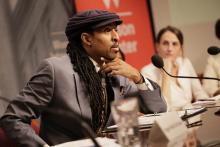
The White House and Pruitt have proposed a budget for the EPA that would cut the agency’s budget by $2 billion and eliminate 20 percent of the workforce, including the entire Office of Environmental Justice. In his letter, Ali suggests the budget cuts will specifically harm those most in need of help, saying that the agency’s new leadership hasn't given "any indication that they are focused or interested in helping those vulnerable communities.”
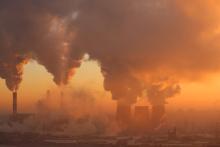
After sessions on gravitational waves, nuclear forensics, and artificial intelligence, one of the world’s largest general science conferences invited attendees to hear from an Episcopal priest.
The Rev. Fletcher Harper preached on climate change, and how to get a vast segment of the world’s population to pay better attention to what scientists know but many others doubt: that the problem is worsening and portends disaster.
“My entreaty for scientists is to be able to speak publicly about why you care,” said Harper, executive director of GreenFaith, an interfaith nonprofit that aims to galvanize religious people to safeguard the environment.

If confirmed, Pruitt should walk into the halls of the Environmental Protection Agency with the same conviction of faith with which he walks into First Baptist Church of the Broken Arrow. He should promote policies to guard clean water and clean air, to protect children from pollution, and to safeguard all of us from the impacts of a changing climate.
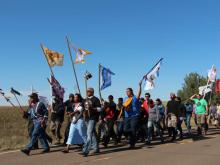
Does Pope Francis have a position on the Dakota Access Pipeline?
That’s one question he hasn’t been asked, and he might demur if pressed on such a specific issue. But in his landmark encyclical on the environment published last year, and in other statements, Francis has strongly supported arguments of the Native American-led resistance movement on three core issues: indigenous rights, water rights and protection of creation.

A common misconception is that to be a pro-life Catholic, one simply has to be anti-abortion and anti-contraception. For years this “pro-life” definition has largely been unchallenged. That is, until recently.
A poll conducted in 2014 by the Public Religion Research Institute found a majority U.S. Catholics favor greater government involvement on economic issues via minimum wage increases, infrastructure investments, and universal healthcare. Furthermore, U.S. Catholics believe that to promote economic growth, the government should raise taxes. These aren’t just pro-growth policies, they’re pro-life policies.

One critical lesson from the environmental justice movement is this: Racial inequity and economic disparities are intertwined fault lines running in different directions, crisscrossing the everyday lives of people of color. History shows by what means the two interact and the consequences. These crisscrossing forces downgrade the quality of life and narrow opportunities for health, housing, and financial stability. Meanwhile whole communities suffer. Remember Flint, Mich. Consider the Sioux Nation’s historic push against the Dakota Access Pipeline.
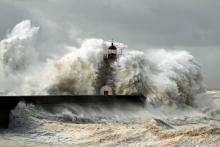
I’m a Christian, but I’m not a natural evangelizer. Talking about my faith has never come easily to me, and I prefer to quietly live my beliefs rather than speak about them. Even as a legislative advocate for the Episcopal Church, I am more at ease discussing policy ramifications than quoting scripture. Still, one urgent policy issue in particular has forced me to reconsider my distaste for religious language and challenged me to voice my faith. Galvanized by the urgency of this challenge, I’m ready to evangelize — about climate change.

There are women in my life I choose to breathe with. With these women, I turn our breath into sounds, sounds into words, and raise them together in solidarity across the currents of justice. Together, we fight for the environment, we fight for rights, for black lives, for women's rights — and constantly strive for peace.
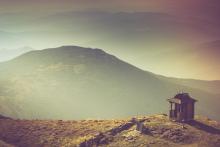
As it turns out, the faith community may have a marked advantage when it comes to dealing with global warming. According to University of British Columbia social psychologist and author Ara Norenzayan, religion primes cooperation. In his work, Norenzayan has found religious societies to be more cooperative than non-religious societies — particularly where a group's survival is threatened.
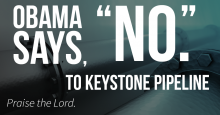
After seven long years of review, the White House plans to reject the request from a Canadian company to build the Keystone XL pipeline, according to The New York Times.
Envrionmental groups across the United States, including 350.org, have begun celebrating the news as a victory for climate activists. Sojourners has long spoke out against the construction of the Keystone pipeline and celebrates this news a win for all those advocating for the protection of creation.
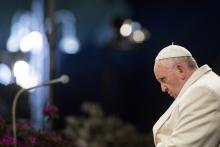
Someone has said that Pope Francis is really a Protestant. He is, if Protestant is defined as someone who protests. His recent encyclical Laudato si' is a protest against the often irresponsible industries as they pollute the environment.
Pope Francis especially protests the ways in which coal is burned in the production of electricity. He is right to protest. What comes out of the smoke stacks of coal-fed electric power plants is linked to 50,000 deaths a year, according to Physicians for Social Responsibility. Because children and the elderly among the poor are the most vulnerable, the pope, following his namesake, St. Francis, has a special concern for those that Jesus calls "the least of these."
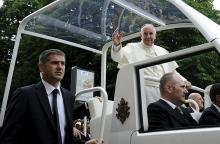
The Vatican on Aug. 10 announced a World Day of Prayer for the Care of Creation, the latest move by Pope Francis to push environmental issues up the global agenda.
The World Day will be celebrated annually on Sept. 1, in line with the Orthodox Church’s day for the protection of the environment, the pope said in the newly-released letter.
“As Christians we wish to offer our contribution towards overcoming the ecological crisis which humanity is living through,” Francis wrote in the letter, addressed to Cardinal Peter Turkson, president of the Pontifical Council for Justice and Peace, and Cardinal Kurt Koch, president of the Pontifical Council for the Promotion of Christian Unity.
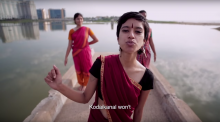
Nicki Minaj usually isn’t associated with Indian workers' rights. But that’s not stopping 27-year-old Chinnai-born rapper Sofia Ashraf from rapping against Unilever, a corporation accused of dumping waste in an Indian town. According to a local environmental group, high levels of mercury can still be traced in vegetation and soil around the former factory.
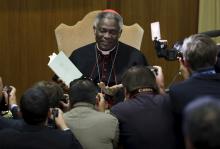
The Vatican is calling on bishops globally to act on the pope’s groundbreaking environmental encyclical, Cardinal Peter Turkson said in an interview.
Last week, bishops’ conferences across the world were sent a message urging them to speak up about the message of the papal letter, which called for greater action on the environment, said Turkson, who is president of the Vatican’s Pontifical Council for Justice and Peace.

Pope Francis writes, “All of us can cooperate as instruments of God for the care of creation, each according to his or her own culture, experience, involvements, and talents.” And it is the combination of our talents that can alter the path of destruction we have traveled down for far too long.
Pope Francis paints the picture of this path all too well.
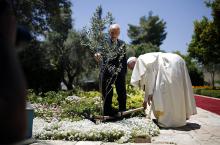
People must change their lifestyles and attitudes to help defeat hunger, Pope Francis said June 11, a hint of what may be coming in his much-anticipated environmental encyclical next week.
“We must begin with our daily lives if we want to change lifestyles, aware that our small gestures can guarantee sustainability and the future of the human family,” said Francis, addressing delegates at a conference hosted by the U.N. Food and Agriculture Organization.
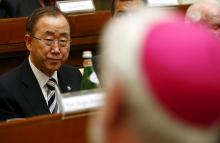
Top officials from the Vatican, the head of the United Nations, and leading scientists came together at a summit April 28 in Vatican City to label the fight against man-made climate change as a “moral issue.”
“Mitigating climate change and adapting to its effects are necessary to eradicate extreme poverty, reduce inequality, and secure equitable, sustainable economic development,” said Ban Ki Moon, U.N. secretary-general, in the keynote speech.
“It is a moral issue. It is an issue of social justice, human rights, and fundamental ethics,” the secretary-general said, adding that “climate change is the defining issue of our time.”